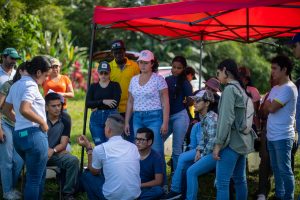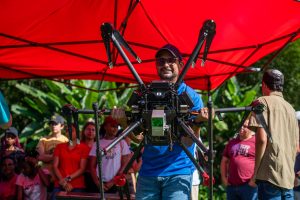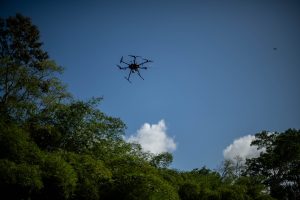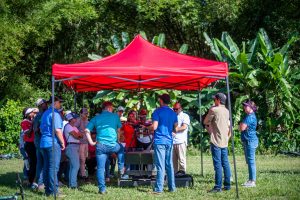Revolutionary farming
 On February 21, students, faculty, and guests gathered on our Guácimo Campus and online for the Drones Symposium: Platforms for Precision Agriculture and Forestry to discuss ideas for implementing new agricultural practices using drones. This amazing technological tool, in recent years, is setting the guidelines to revolutionize precision agriculture in Costa Rica and worldwide.
On February 21, students, faculty, and guests gathered on our Guácimo Campus and online for the Drones Symposium: Platforms for Precision Agriculture and Forestry to discuss ideas for implementing new agricultural practices using drones. This amazing technological tool, in recent years, is setting the guidelines to revolutionize precision agriculture in Costa Rica and worldwide.
 “Today, essential decision-making tasks in agriculture and natural resource management can be performed much more accurately and quickly using remote sensing, digital mapping technologies, digital photogrammetry, and geographic information systems,” said Victor Hugo Morales, professor of Tropical Forestry and head of the University’s Center for Geomatics and Remote Sensing.
“Today, essential decision-making tasks in agriculture and natural resource management can be performed much more accurately and quickly using remote sensing, digital mapping technologies, digital photogrammetry, and geographic information systems,” said Victor Hugo Morales, professor of Tropical Forestry and head of the University’s Center for Geomatics and Remote Sensing.
 The symposium was divided into morning and afternoon sessions. In the morning, there were talks by speakers from Índigo Drones (Costa Rica), Drontek Centroamérica, Dronity (Chile), Banco de Costa Rica, I+D – Marolio (Argentina), and the University of Alberta. Speakers covered topics such as precision spraying, LiDAR applications in estimating biomass and carbon in forest ecosystems, and challenges for entrepreneurs with drones. The talks were held in person in the Emory L. Cocke Auditorium and virtually, where more than 350 people participated in the Zoom session!
The symposium was divided into morning and afternoon sessions. In the morning, there were talks by speakers from Índigo Drones (Costa Rica), Drontek Centroamérica, Dronity (Chile), Banco de Costa Rica, I+D – Marolio (Argentina), and the University of Alberta. Speakers covered topics such as precision spraying, LiDAR applications in estimating biomass and carbon in forest ecosystems, and challenges for entrepreneurs with drones. The talks were held in person in the Emory L. Cocke Auditorium and virtually, where more than 350 people participated in the Zoom session!
 Victor Hugo emphasized some of the lessons learned in using drones through ChatGPT, such as knowing local and national regulations; taking proper safety precautions, including wearing eye protection, assessing weather conditions, and identifying obstacles; planning for a successful mission by taking into account the climate, equipment preparation, and identifying mission objectives; and proper equipment maintenance, including cleaning, inspecting parts and components, and updating software.
Victor Hugo emphasized some of the lessons learned in using drones through ChatGPT, such as knowing local and national regulations; taking proper safety precautions, including wearing eye protection, assessing weather conditions, and identifying obstacles; planning for a successful mission by taking into account the climate, equipment preparation, and identifying mission objectives; and proper equipment maintenance, including cleaning, inspecting parts and components, and updating software.
In the afternoon, there were demonstrations with drones. Participants were divided into different stations, where they learned more about drone models and systems, such as the AGRAS T40, DJI Terra, and the MAVIC 3 Multispectral.
We thank Professor Victor Hugo and all the people who made this symposium possible, where we learned about new revolutionary farming methods that can improve food systems worldwide.




